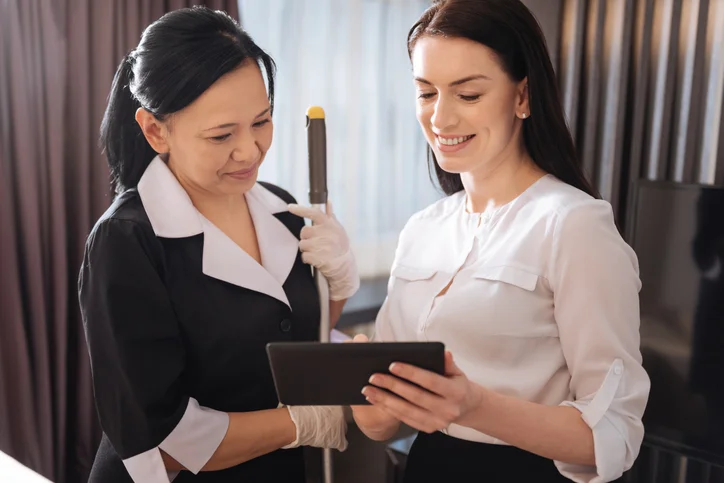
How to Become a Housekeeping Pro: Expert Tips & Tricks
Are you looking to embark on a fulfilling career that combines organization, attention to detail, and a touch of hospitality? Becoming a housekeeper might just be the perfect fit for you.
As you explore this path, imagine the satisfaction that comes from transforming spaces into clean, welcoming environments. Imagine the joy of knowing that your work brings comfort and relaxation to others. In this guide, you’ll uncover the essential steps to kickstart your career in housekeeping.
You’ll learn practical tips, discover key skills, and find out how to stand out in this rewarding field. So, if you’re ready to take the first step towards a career that not only meets your practical needs but also enriches your life, keep reading. Your future in housekeeping awaits!

Essential Skills For Housekeeping
Housekeeping demands specific skills to perform tasks efficiently and effectively. Mastering these skills ensures that spaces remain clean, organized, and welcoming. Let’s explore the essential skills needed for successful housekeeping.
Attention To Detail
Spotting small things makes a big difference in housekeeping. Dust in corners, smudged mirrors, and missed spots are easy to overlook. A keen eye helps maintain a spotless environment. Regular checks help ensure thorough cleaning. Focus on every aspect of a room. This ensures nothing is missed.
Time Management
Housekeeping involves juggling many tasks within a limited timeframe. Prioritize tasks based on importance and urgency. This ensures efficient use of time. Create a cleaning schedule to help plan your day. Stick to your schedule to stay on track and meet deadlines. Efficient time use increases productivity and reduces stress.
Organization Techniques
Being organized makes housekeeping more manageable and less stressful. Use labels for storage areas to easily find and store items. Group similar items together to save time during cleaning. Keep cleaning supplies in accessible locations to reduce time spent searching. A tidy workspace leads to faster and more efficient cleaning.
Cleaning Tools And Products
Becoming a skilled housekeeper requires using the right cleaning tools and products. Essential items include vacuums, mops, and microfiber cloths for efficient cleaning. Choosing eco-friendly products ensures safety and sustainability, making housekeeping both effective and responsible.
Cleaning tools and products are the backbone of effective housekeeping. They transform daunting tasks into manageable routines, ensuring every corner of your home sparkles. Choosing the right tools and products not only saves time but also enhances the quality of cleaning. Let’s dive into the essentials that will elevate your housekeeping game.
Must-have Cleaning Supplies
Every housekeeper needs a reliable arsenal of cleaning supplies. A good start includes a high-quality vacuum cleaner, microfiber cloths, and a sturdy mop. These tools tackle dirt and dust efficiently, leaving surfaces spotless. Consider having an all-purpose cleaner for various surfaces. It simplifies your cleaning routine and reduces clutter in your supply cabinet. A dedicated glass cleaner ensures streak-free windows and mirrors, adding that extra shine. Don’t forget about protective gear like gloves. They keep your hands safe from harsh chemicals and potential allergens. Are you ready to equip your cleaning toolkit with these essentials?
Eco-friendly Alternatives
Embracing eco-friendly cleaning options helps protect the environment and your health. Vinegar, baking soda, and lemon juice are natural cleaners that work wonders on tough stains and odors. They are safe, affordable, and easily available. Reusable cleaning cloths and biodegradable sponges reduce waste significantly. These alternatives are just as effective as their disposable counterparts, making them a wise choice for sustainable living. Switching to eco-friendly products can be a rewarding experience. Have you considered the impact of your cleaning habits on the planet?
Tool Maintenance And Care
Maintaining your cleaning tools ensures they last longer and perform better. Regularly clean your vacuum filter and empty its bag or canister to maintain suction power. A well-maintained vacuum not only cleans better but also saves you money in the long run. Wash microfiber cloths separately to prevent lint transfer and maintain their effectiveness. Proper care keeps them soft and absorbent, ready for your next cleaning session. Inspect your mop and replace the head when worn out. A fresh mop head ensures effective cleaning and avoids spreading dirt. How often do you check and care for your cleaning tools? Whether you’re a seasoned pro or new to housekeeping, the right cleaning tools and products make all the difference. Equip yourself with these essentials, and watch your home transform with ease.
Room-by-room Cleaning Strategies
When you think about housekeeping, the idea of tackling an entire home might feel overwhelming. However, breaking it down into room-by-room cleaning strategies can make the process more manageable and efficient. Focusing on one room at a time not only helps you stay organized but also ensures that every space gets the attention it deserves.
Kitchen Cleaning Tips
The kitchen is often the heart of the home, but it can easily become a hotspot for messes. Start by wiping down countertops and appliances to remove crumbs and spills. Pay special attention to the sink—clean it thoroughly to prevent bacteria buildup.
Consider cleaning the refrigerator regularly. It’s surprising how quickly leftovers and forgotten items can accumulate. A simple habit of checking expiration dates can keep your fridge fresh and organized.
- Use a mixture of vinegar and water for a natural cleaning solution.
- Keep a cloth handy for quick spill clean-ups.
- Don’t forget to sweep and mop the floor!
Bathroom Sanitization
The bathroom requires a focus on sanitization. Start with the toilet; use a disinfectant and scrub thoroughly. Pay attention to areas like the handle and seat where germs are often overlooked.
Mirrors and counters can be cleaned with a glass cleaner for a streak-free shine. Regularly wash towels and bath mats to keep the space fresh. Consider adding a small basket for toiletries to reduce clutter.
- Use bleach-based products for deep sanitization.
- Replace old toothbrushes monthly.
- Keep a window open or a fan on to prevent moisture buildup.
Living Room And Bedroom Care
Living rooms and bedrooms are where you relax, so they should be comfortable and tidy. Dusting surfaces is key to maintaining a clean environment—don’t forget shelves and picture frames. Vacuum carpets and rugs to remove dust and allergens.
In the bedroom, make the bed daily. It’s a small task that instantly makes the room look put together. Consider organizing your closet regularly to keep clothing neat and accessible.
- Use a microfiber cloth for dusting.
- Change bed linens weekly for freshness.
- Store small items in decorative boxes to minimize clutter.
How do you feel when you enter a room that’s freshly cleaned? Does it change your mood or energy? Implementing room-by-room strategies might just be the key to a happier, healthier home.

Advanced Techniques For Tough Stains
Dealing with tough stains can be a real challenge for any housekeeper. It’s not just about cleaning; it’s about mastering the art of stain removal. Imagine walking into a room and seeing a coffee spill or stubborn wine mark on the carpet. You need to know not just how to clean it, but how to make it disappear as if it was never there. Let’s explore some advanced techniques for tackling those pesky stains, making your cleaning routine more efficient and effective.
Carpet And Upholstery Stains
Carpets and upholstery are magnets for spills and stains. A simple trick is to use a mixture of baking soda and vinegar. Sprinkle baking soda on the stain, then spray vinegar over it. Let it fizz, then scrub gently.
Club soda is also a secret weapon against fresh stains. Pour it on the stain and blot with a clean cloth. This works wonders on wine and coffee stains.
Have you ever tried using shaving cream? Apply it directly on the stain, let it sit for 30 minutes, then rinse with water. It’s surprisingly effective!
Hard Surface Stains
Hard surfaces like tiles can be tricky. Lemon juice mixed with salt can tackle rust stains effortlessly. The acidity breaks down the rust, while the salt scrubs it away.
For water stains on glass, use vinegar and newspaper. Spray vinegar and wipe with crumpled newspaper for a streak-free shine.
Did you know toothpaste can remove crayon marks from walls? Apply a small amount, scrub with a brush, and wipe clean. It’s a lifesaver for those with kids!
Odor Removal Solutions
Stains aren’t the only culprits; odors can linger long after cleaning. A bowl of coffee grounds can absorb odors in a room. It’s a simple yet effective fix.
For upholstery, sprinkle baking soda, let it sit, then vacuum. This neutralizes odors trapped in the fabric.
Have you considered using vodka? Spray it lightly on fabrics to remove odors. It evaporates quickly, leaving no smell behind.
So, what’s your toughest stain story? Have you tried any of these techniques yet? Share your experiences, and let’s tackle those stains together!
Organizing And Decluttering
Starting with a clear plan simplifies housekeeping. Break tasks into small steps for easy management. Regularly sorting items prevents clutter buildup. Use storage solutions to keep everything in place. Consistency in organizing helps maintain a clean and tidy home environment.
Keeping a home tidy and welcoming is an art that starts with organizing and decluttering. These two essentials form the backbone of effective housekeeping, creating a space that feels open and inviting. By mastering the art of organization, you not only improve the aesthetic of your home but also bring a sense of calm to your everyday life. Let’s dive into how you can achieve a clutter-free and organized environment.
Creating A Decluttering Plan
Start small to avoid feeling overwhelmed. Choose one room or area to focus on, like a closet or kitchen pantry. Set clear goals for what you want to achieve in that space. Make a list of items you use regularly and those you haven’t touched in months. This helps you decide what to keep, donate, or discard. Don’t forget to involve your family in the process; it’s a great way to teach kids about the importance of organization. Consider setting a timer for each decluttering session. You’ll be surprised at how much you can accomplish in just 15 or 30 minutes. Plus, it keeps the process from feeling endless.
Storage Solutions
Effective storage solutions can transform any space. Use clear bins and label them for easy identification. This makes it easier to find what you need without digging through piles of stuff. Think vertically to maximize space. Shelves can be your best friend, especially in small areas. Install hooks on walls for bags, hats, or even kitchen utensils to free up counter space. Don’t underestimate the power of multi-functional furniture. Ottomans with storage, beds with drawers, and foldable tables can provide extra storage without sacrificing style.
Maintaining Order
Consistency is key to maintaining an organized home. Dedicate a few minutes each day to tidying up. Returning items to their designated spots keeps clutter from creeping back. Develop a habit of reassessing your belongings regularly. Ask yourself if you still need each item or if it’s just taking up space. This prevents unnecessary clutter from accumulating over time. Finally, make organizing a family affair. Assign each family member their own responsibilities. When everyone pitches in, maintaining order becomes a shared goal, not a solo task. What strategies have you found effective in keeping your home organized? Share your tips and inspire others to create their own clutter-free sanctuaries!

Safety And Health Considerations
Ensuring safety and health is crucial in housekeeping. Proper training in handling cleaning chemicals protects workers from harm. Regular use of gloves and masks reduces exposure to allergens and dust.
Ensuring safety and health is crucial when working in housekeeping. You might not think of it right away, but the job involves risks that can affect your well-being. Paying attention to these considerations can protect you and make your work more efficient.
Proper Handling Of Chemicals
Housekeeping often involves using various cleaning products. These can be harmful if not handled correctly. Always read the labels and follow instructions. Use gloves to protect your skin from harsh chemicals. Wear masks if needed to avoid inhaling fumes. Never mix cleaning products, as this can create dangerous reactions. Consider this: a friend once mixed bleach and ammonia, thinking it would clean better, but ended up with a trip to the emergency room. Safety first, always.
Ergonomic Cleaning Practices
Housekeeping can be physically demanding. Using ergonomic practices can prevent strains and injuries. Use tools with long handles to avoid bending too much. Switch hands often to balance the workload on your body. Ensure your movements are smooth and controlled. Think about your daily activities. Are you lifting heavy objects properly? Are you using your knees and not your back? Small changes can make a big difference.
Allergy Prevention
Cleaning can stir up dust and allergens. This can be challenging if you or your clients have allergies. Use hypoallergenic products whenever possible. Regularly replace vacuum filters and dust cloths. These small actions reduce allergens in the environment. Have you ever sneezed non-stop after cleaning a dusty room? It’s not just a nuisance; it’s a sign you might need to change your approach. Prioritize your health by planning ahead and using the right materials.
Professional Housekeeping Tips
Embarking on a career in housekeeping requires more than just cleaning skills. It’s about mastering the art of communication, setting clear expectations, and building a solid reputation. These professional housekeeping tips will guide you towards becoming a successful housekeeper, whether you’re just starting or looking to enhance your existing skills.
Client Communication
Effective communication is the cornerstone of a successful housekeeping career. Begin by listening to your clients’ needs and preferences. This helps you understand their expectations and tailor your services accordingly.
Engage with your clients regularly. Ask for feedback after each service. This shows you care about their satisfaction and are committed to improving.
Be polite and approachable. A friendly demeanor encourages clients to open up about their needs. Remember, a satisfied client is more likely to recommend your services to others.
Setting Expectations
Setting clear expectations is crucial in housekeeping. Discuss the scope of your services upfront to avoid misunderstandings. Clearly outline what tasks you will perform and any limitations.
Define your availability and working hours. This ensures clients know when to expect your services and helps you manage your schedule effectively.
Set realistic timelines for task completion. If a job will take longer than anticipated, inform your client. This transparency builds trust and prevents dissatisfaction.
Building A Reputation
Reputation is everything in housekeeping. Deliver consistent quality in your services to build trust with your clients. A good reputation attracts more business and can lead to better opportunities.
Consider joining a professional housekeeping association. This can boost your credibility and provide valuable networking opportunities.
Reflect on your own experiences. What have you learned from past clients that you can apply to future jobs? Use these insights to continually improve your service.
Are you ready to take your housekeeping career to the next level? Implement these tips and watch your business grow.
Staying Updated With Trends
Housekeeping is a dynamic field. To excel, staying updated is key. New trends in cleaning transform how tasks are done. Knowing these trends can improve efficiency and satisfaction. Learn how technology and sustainability are shaping modern housekeeping.
Latest Cleaning Innovations
Cleaning methods evolve with time. Innovations make cleaning easier and faster. Steam cleaning is popular for deep cleaning surfaces. It kills germs and is gentle on materials. Automated vacuum cleaners save time and effort. They clean floors with minimal supervision.
Eco-friendly cleaning products are gaining traction. They are safe for the environment and effective in removing dirt. Keeping up with these innovations can make a housekeeper’s job more effective.
Sustainability In Housekeeping
Sustainable practices are important in housekeeping. Using biodegradable cleaners reduces environmental impact. They are less harmful to health and nature. Recycling waste is another sustainable practice. It helps reduce the amount of trash.
Energy-saving appliances are also valuable. They consume less power, saving money and resources. Embracing sustainability attracts eco-conscious clients.
Digital Tools And Apps
Technology plays a significant role in housekeeping. Digital tools simplify scheduling and task management. Apps help track progress and improve communication. They offer reminders and updates on tasks.
Online tutorials and guides offer training opportunities. They help improve skills and knowledge. Using digital tools enhances productivity and efficiency in housekeeping.
Frequently Asked Questions
What Are The Duties Of A Housekeeper?
A housekeeper maintains cleanliness and order in various settings. Duties include cleaning, organizing, laundry, and sometimes cooking. They ensure that living and working environments are tidy and pleasant. Housekeepers may also manage inventory of cleaning supplies and report any maintenance issues.
Their role is crucial for comfort and hygiene.
What Skills Do Housekeepers Need?
Housekeepers require attention to detail, time management, and reliability. Good communication skills are important, especially in hotels or large households. Physical stamina is necessary for long hours and manual tasks. Basic knowledge of cleaning products and safety practices is essential.
Organizational skills help manage multiple tasks efficiently.
How Do I Start A Housekeeping Career?
Begin by gaining basic cleaning skills and experience. Apply for entry-level housekeeping jobs in hotels or private homes. Consider obtaining certifications in cleaning and safety standards. Networking with industry professionals can open opportunities. Building a reputation for reliability and attention to detail enhances career prospects.
Are There Certifications For Housekeeping?
Yes, certifications enhance a housekeeper’s credentials. Programs like the Certified Executive Housekeeper (CEH) or International Executive Housekeepers Association (IEHA) offer training. Certifications cover cleaning techniques, safety standards, and management skills. They provide a competitive edge and demonstrate professionalism. Consider enrolling in online or local courses to gain qualifications.
Conclusion
Becoming a housekeeper offers a rewarding career path. Start by learning basic cleaning skills. Practice organization and time management daily. Build good communication with clients and team members. Seek certification for better job opportunities. Stay updated with new cleaning techniques and tools.
Experience and dedication pave the way to success. Always strive for excellence in your work. A positive attitude makes a big difference. Remember, every little effort counts in housekeeping. Your journey begins with a single step. Embrace it and watch your skills grow.
Good luck on your housekeeping adventure!




